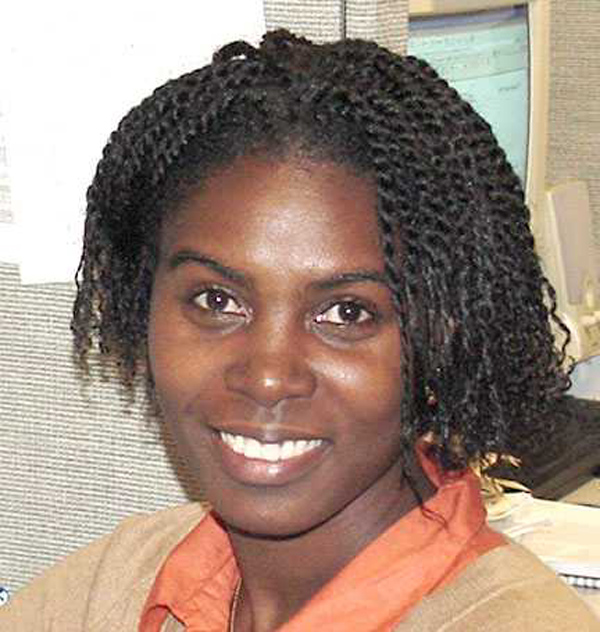Dr. Delivette Castor joined the Rockefeller University Clinical Scholars Program in December 2006 just after completing her Doctorate in Epidemiology at Columbia University in New York City. At Columbia, Dr. Castor focused her research on the role of drug resistance on treatment outcomes in individuals with advanced HIV disease. Her current HIV research focuses on the influences of sexual and drug-using behaviors, social networks and social isolation on HIV-1 transmission among men who have sex with men. “It has been established that the level of virus in the blood is extremely high during early HIV infection. There is a growing body of literature that tells us that people periodically engage in higher risk behaviors, and that this b ehavior pattern could have synergistic effects with the biology of HIV. That is, at the time of infection when they have the highest viral loads, their social isolation leds them to have more risky events, therefore increasing their chances of transmitting the virus to others.”
ehavior pattern could have synergistic effects with the biology of HIV. That is, at the time of infection when they have the highest viral loads, their social isolation leds them to have more risky events, therefore increasing their chances of transmitting the virus to others.”
A self-defined “story of serendipity”, she interviewed at other academic institutions as well as pharmaceutical companies looking for the ideal place to continue her research interests of social predictors and biological outcomes. She repeatedly came across Dr. Martin Markowitz’s name in the HIV literature and decided to email him. He immediately responded, informing her that he was working on obtaining funding for a study that would focus on the role of social networks on HIV transmission. For her it was the perfect opportunity and so she applied to the Clinical Scholar program, with Dr. Markowitz as her mentor. While the original study was not funded, Dr. Castor was able to create a pilot study titled, “A Pilot Study of the NY HIV Transmission study: Project HITS-NY, Illicit Drug Use and Social Network Effects among at Risk and Recently/Acutely HIV-1 Infected Men who have Sex with Men (MSM)”, which she is conducting at the Rockefeller University Hospital Outpatient Research Center. The target sample is 280 MSM enrolled over a three-year period, and 60 individuals have participated so far. She is currently performing an interim analysis of her data.
Dr. Castor’s goal in this research is to link sociological and epidemiological information about individuals and their social context with the viral phylogenetic information obtained through sequence analyses to better identify potential points of intervention. “I want to answer the question, who are the core group individuals and what are the pre-existing intangibles that define and connect these core group individuals?” She has been working on organizing the HIV viral sequences that Dr. Markowitz has been collecting since 1995, a cohort that has grown to over 500 recently HIV-1 infected individuals. “With the help of our Hospital’s demographic computer program and the Center Information Technology department, I have been able to link the demographic data to clinical and virologic data. This has allowed me to describe these sample characteristics, clinical and virologic, demographically, geographically and temporally.”
The next step for Dr. Castor is to devise a plan to gain access to more minority MSM populations. “Right now about 80% of the participants are caucasian. The volunteers come to the outapatient research center typically by “passive” recruitment, through referrals from their physician, a friend who has been a volunteer in the past, or the health department. The sample is a very select population based on what I would call an information bias - those who know we exist and get here. I hope to create a strategy, based on the success I found in my focus groups, that will identify venues that are frequented by men of color who are also men who have sex with men. These venues would then be the target for recruitment and dissemination of information on the early signs of HIV infection.” She feels that the Rockefeller University Center for Clinical and Translational Science is an excellent institution to conduct her research. “This is a great work environment. Being here makes the research feel very possible. There are always hurdles to overcome, but if the research is going to happen, I believe it will happen here.”
Dr. Castor described several benefits to her decision to join the Clinical Scholar Program. “First, the challenge of being a “non-clinician” in a clinical setting has helped me to see other views and consider other possibilities. It has also multiplied my own personal breadth of knowledge. I am always learning about other disciplines outside of my own, while still increasing my skills in my area of expertise. Dr. Markowitz has been extremely supportive and creative in mentoring me. Since he is an MD, my non-clinical academic track has been a novel experience for him. And of course Dr. Coller always has at least 10 pieces of wisdom to impart on us at our weekly meetings.”
When asked about her long-term goals Dr. Castor replied, “To take translational science from the bench to “the curb” (laughs). I want to continue my research but it must have implications for the community. The research must be meaningful to the population in terms of creating interventions for people before they become patients.”
November 11, 2008
Meet the Scholar: Delivette Castor, Ph.D.
By Jennifer Spada
